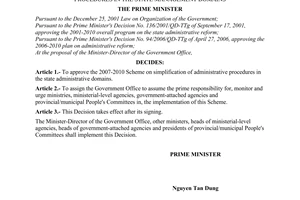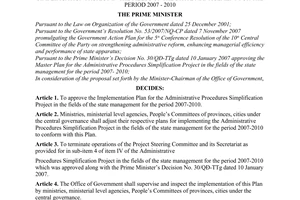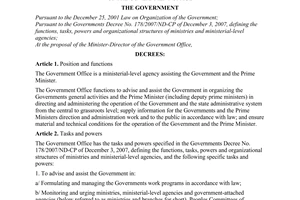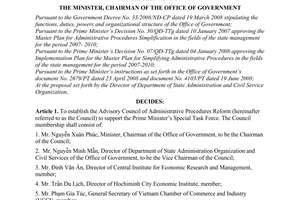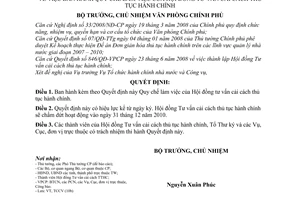Nội dung toàn văn Decision No. 1645/QD-VPCP of December 30, 2008, on promulgating the working regulation of the advisory council of administrative procedures reform
|
OFFICE
OF GOVERNMENT |
SOCIALIST
REPUBLIC OF VIETNAM Independence
- Freedom – Happiness |
|
No.: 1645/QD-VPCP |
Hanoi, December 30th, 2008 |
DECISION
ON PROMULGATING THE WORKING REGULATION OF THE ADVISORY COUNCIL OF ADMINISTRATIVE PROCEDURES REFORM
MINISTER, CHAIRMAN OF THE OFFICE OF GOVERNMENT
Pursuant to the Government’s
Decree no. 33/2008/NĐ-CP dated 19 March 2008 stipulating functions, duties,
powers and organizational structure of the Office of Government;
Pursuant to the Prime Minister’s Decision no. 07/QD-TTg dated 4 January 2008
approving the Implementation Plan for the Master Plan for the Administrative
Procedures Simplification Project in the fields of the state management for the
period 2007-2010;
Pursuant to the Government’s Decision no. 846/QĐ-VPCP dated 23 June 2008 on the
establishment of the Advisory Council of Administrative Procedures Reform;
In consideration of the proposal set forth by the Director of the State Management
and Civil Service of the Office of Government,
DECIDES:
Article 1. To promulgate along with this Decision the Working Regulation of the Advisory Council of Administrative Procedures Reform.
Article 2. This Decision shall come into force from the date of its signing. Advisory Council of Administrative Procedures Reform shall put an end to operation on 31st December 2010.
Article 3. Members of the Advisory Council of Administrative Procedures Reform, the Secretariate and departments, units under the Office of Government shall be responsible for implementing this Decision./.
|
Recipients: |
MINISTER,
CHAIRMAN |
WORKING REGULATION
OF
THE ADVISORY COUNCIL OF ADMINISTRATIVE PROCEDURES REFORM
(Promulgated along with the Minister, Chairman of the Office of Government’s
Decision no. 1645 /QĐ-VPCP dated December 30th, 2008)
Article 1. Functions of the Advisory Council of Administrative Procedures Reform
The Advisory Council of Administrative Procedures Reform (hereinafter referred to as the Council) is an advisory and supporting body to the Prime Minister’s Special Task Force (hereinafter referred to as STF) in implementing objectives, duties as set forth in the Decision no.30 dated 10 January 2007 approved by the Prime Minister regarding the Administrative
Procedures Simplification Project in the fields of the state management for the period 2007-2010 (hereinafter referred to as Project); Decision no.07/QĐ-TTg dated 04 January, 2008 approved by the Prime Minister regarding the Master Plan to implement the Project.
Article 2. Responsibilities of the Council
1. Represent the business sector, academic institutions and citizens to participate in consultation to STF to ensure effective implementation of objectives and tasks as set by the administrative procedure reform.
2. Engage in mobilizing resources in support of the Council and STF operation.
3. Collect factual evidence on individual procedures causing difficulties for businesses and citizens.
4. Identify missing administrative procedures in the inventory phase.
5. Provide information on inappropriate administrative procedures that need to be adjusted and simplified by using forms of administrative procedure review as required by STF.
6. Identify prioritized areas for review and study, collaborate with the STF to organize study and propose solutions to simplify administrative procedures.
7. Communicate goals and missions of the Project in order to strenghthen support and promote engagement from the business community and citizens.
Article 3. Organizational structure of the Council
1. The Council comprise 15 members, including the chairman, vice chairman and members of the Council.
Background and number of members in the Council shall possibly change under the decision by Minister, Chairman of the Office of Government (hereinafter referred to as OOG).
2. Assisting the Council shall be the Secretariat and working groups.
a) The Secretariat will include members appointed from the OOG’s
Department of State Administration Organization and Civil Service and be led by director of Department.
In addition to the above members, the Secretariat team may be supplemented with more staff from outside or inside OOG to ensure the completion of assigned duties.
b) Working groups including experts shall be mobilized by the Council members in order to carry out study and administrative procedure simplification as required by the Council.
Article 4. Responsibilities of the Chairman of the Council
1. Take overall responsibility for the Council’s operations to ensure implementation of tasks as set forth in Article 2 of this Regulation.
2. Decide upon the agenda, contents of work of the Council and issues for the Council’s comment.
3. Decide upon timing and venue of Council’s meetings.
4. Chair Council’s meetings to discuss and summarize, conclude on issues relating to the Council’s operation.
5. Assign work to Council members.
Article 5. Responsibilities of the Vice Chairman of the Council
1. Carry out the tasks as set forth in Article 2 hereof and tasks as assigned by the Chairman and Council.
2. Chair and make conclusions at Council’s meetings/working sessions upon the authorization by the Chairman. Have full power in signing in invitation letters for Council meetings and working sessions, in documents sent to Council members for comments and in other related documents as approved by the Council Chairman.
3. Directly guide, examine and supervise the Secretariat in implementing tasks as decided by the Council.
4. Take charge of mobilizing, managing and utilizing sponsor funds in support of the Council and STF’s operations; provide information for communication and concerning agencies; communicate goals and missions of the Council and the Project.
Article 6. Responsibilities of members of the Council
1. Carry out the tasks as set forth in Article 2 hereof and other tasks assigned by the Chairman of the Council.
2. Be responsible for attending all Council’s meetings and other activities of the Council and contributing comments on issues raised in meeting agendas of the Council.
3. Based on capacity, mobilize experts to set up working groups to carry out study and administrative procedure simplification as required by the Council.
4. Mobilize the support and engagement of organizations and individuals in the Council’s activities.
5. Be provided with information and related documents to support in carrying out study and providing feedback; at the same time take responsibilities of confidentiality in regard with provided information and documents as set by law.
Article 7. Responsibilities of the Secretariat
1. Develop working agenda for the Council and submit for the Council and its Chairman’s approval.
2. Prepare draft of conclusion notice letter of Council's working sessions/meetings and other documents as requested by the Council’s Chairman.
3. Send related documents, conclusion notices and other substantials of the council meetings to absent members; summarize written comments made by absent members to report to the Council.
4. Carry out administrative tasks and tasks relating to office administration supporting general operation of the Council.
5. Support the Council members, working groups and related individuals and organizations in implementing tasks as required by the council and Council Chairman.
6. Advise and propose to the Council solutions to fulfill tasks as set forth in Article 2 hereof.
7. Coordinate the Council’s working groups with the STF in implementing inventories, reviews of administrative procedures in accordance with the set plan.
8. Supervise and support working groups and periodically report on progress of tasks under the Secretariat and each working group to the Council.
Article 8. Responsibilities of working groups
Working groups shall have responsibilities to support the Council to conduct the following tasks:
1. Collect information and identify missing administrative procedures
in inventory phase carried out by the STF.
2. Provide information about administrative procedures during review phase by filling in forms of administrative procedure review.
3. Carry out study and review; propose solutions to simplification of administrative procedures as required by the Council.
Article 9. Working Relationship
1. On the basis of the objectives and work plan of the STF, the Council shall advise, cooperate directly with STF in implementing the objectives, tasks as set forth in the Master Plan for the Project.
2. Head of the Council and head of STF will communicate regularly to ensure the effective coordination in order to achieve the objectives and comply with the set plan.
3. Head of the Secretariat shall have weekly or irregular meeting with representative from STF on the progress and issues to be settled.
4. Secretariat staff may assist STF staff, subject to the head of the Secretariat’s approval.
5. The Council’s working groups shall collaborate closely with STF to ensure consistency in progress and quality of work. Secretariat and STF members are invited to group working sessions and discussions of working groups.
6. Working groups need to have close collaboration, exchange experience and share results of studies on administrative procedures relative to each other.
Article 10. Working regime for the Advisory Council of Administrative Procedure Reform
1. The Council shall hold periodic meetings every month or irregular meetings as decided by the Chairman of the Council.
Depending on meeting contents, the Council may invite representatives from STF, working groups or other stakeholders to attend meetings.
2. Issues to be addressed will be discussed collectively and concluded upon by the meeting chairperson. The Council chairman or vice chairman (as authorized by the chairman) may preside over such meetings and make conclusions thereof.
3. In addition to such direct concentration discussions at meetings, the Council may collect written comments from members.
4. Duties, functions and tasks shall be assigned reasonably among the Council members by areas of work.
Each member may be assigned based on his or her qualifications or working conditions, to be responsible for leading and supporting one or more than one certain working groups or assigned with any other areas of work within the Council’s work tasks.
5. Absent official Council members may appoint their representatives to attend meetings on their behalf to comment directly or in writing and send which for the Secretariat’s summary and report to the Council.
6. In the course of operation, the Council may send delegations on local and international study tours.
Article 11. Working regime for the Secretariat
1. The Secretariat shall report directly to the Chairman, Vice Chairman of the Council.
2. The Secretariat staff shall be assigned tasks by and report to the head of the Secretariat.
3. The Secretariat shall work indepedently and directly with other organizations, associations as required.
4. The head of the Secretariat shall attend and report on progress and issues at the Council meetings.
Article 12. Working regime for working groups
1. Working groups shall be directed by the Council member who is assigned to lead that group, at the same time collaborate closely with STF and the Secretariat in terms of technical expertise and working progress.
2. Detailed working regime for each group will be decided by the head that group.
Article 13. Resources for operation
1. The Council, Secretariat and working groups shall operate on the basis of funding from Council members and other sources. Expenses for working groups will be funded from the budget of the association/agency that the Council member work for.
2. Interests for members of the Council and the Secretariat shall be decided by the Chairman of the Council.
3. The Accounting Department of the OOG shall be responsible to support the Council in managing, utilizing support funding for the Council, ensuring full compliance as set forth in laws.
Article 14. Last provision
1. Revisions, supplements made to this Regulation shall be put forth by the Council and decided by the Minister, Chairman of the OOG.
2. Members of the Council shall participate in the Council on a volunteering basis. In case one member does not continue to participate in the council, he or she shall notice in writing to Minister, Chairman of OOG.
3. The Council operation shall be terminated on 31st December 2010./.
